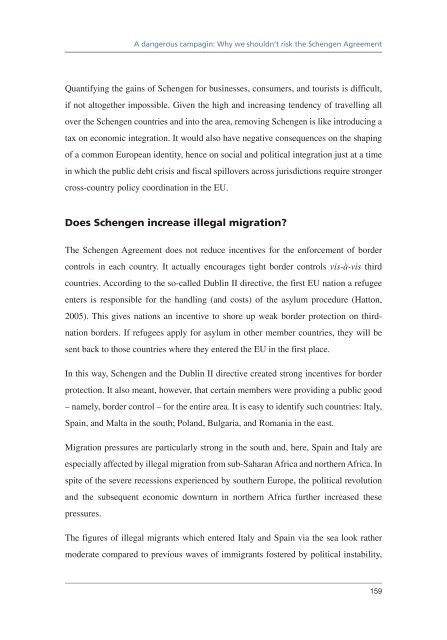Download PDF - Vox
Download PDF - Vox
Download PDF - Vox
- No tags were found...
You also want an ePaper? Increase the reach of your titles
YUMPU automatically turns print PDFs into web optimized ePapers that Google loves.
A dangerous campagin: Why we shouldn’t risk the Schengen AgreementQuantifying the gains of Schengen for businesses, consumers, and tourists is difficult,if not altogether impossible. Given the high and increasing tendency of travelling allover the Schengen countries and into the area, removing Schengen is like introducing atax on economic integration. It would also have negative consequences on the shapingof a common European identity, hence on social and political integration just at a timein which the public debt crisis and fiscal spillovers across jurisdictions require strongercross-country policy coordination in the EU.Does Schengen increase illegal migration?The Schengen Agreement does not reduce incentives for the enforcement of bordercontrols in each country. It actually encourages tight border controls vis-à-vis thirdcountries. According to the so-called Dublin II directive, the first EU nation a refugeeenters is responsible for the handling (and costs) of the asylum procedure (Hatton,2005). This gives nations an incentive to shore up weak border protection on thirdnationborders. If refugees apply for asylum in other member countries, they will besent back to those countries where they entered the EU in the first place.In this way, Schengen and the Dublin II directive created strong incentives for borderprotection. It also meant, however, that certain members were providing a public good– namely, border control – for the entire area. It is easy to identify such countries: Italy,Spain, and Malta in the south; Poland, Bulgaria, and Romania in the east.Migration pressures are particularly strong in the south and, here, Spain and Italy areespecially affected by illegal migration from sub-Saharan Africa and northern Africa. Inspite of the severe recessions experienced by southern Europe, the political revolutionand the subsequent economic downturn in northern Africa further increased thesepressures.The figures of illegal migrants which entered Italy and Spain via the sea look rathermoderate compared to previous waves of immigrants fostered by political instability,159














